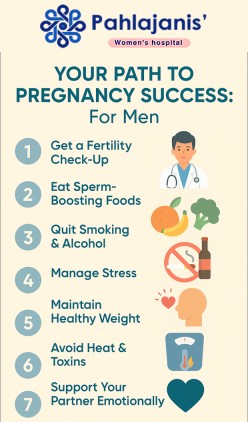When it comes to pregnancy, most people think about the woman’s health, body, and emotions. But the truth is, men play a very important role too. If you are planning to become a father, it’s time to take care of your health and lifestyle. This blog will guide you through the most essential pregnancy planning tips for men—from boosting your fertility to supporting your partner emotionally and physically.
According to the World Health Organization (WHO), around 17.5% of the adult population—roughly 1 in 6 people—experience infertility. In about 40–50% of these cases, male factors contribute to the couple’s difficulty in conceiving. That’s why understanding and following the right pregnancy planning tips for men is crucial for your family’s future.
Why Men Should Plan for Pregnancy Too
Planning for pregnancy isn’t only about women. As a man, your sperm health, mental well-being, and lifestyle choices directly affect your chances of becoming a father. Healthy sperm increases the chances of a successful pregnancy and reduces the risk of miscarriage or birth defects.
Think of it like this: if both partners are healthy and prepared, the journey to parenthood becomes smoother and happier. So, let’s look at the steps every man should take to prepare for this life-changing moment.
Guys, planning for a baby isn’t just her job—take the first step today: https://www.youtube.com/watch?v=Z2Q3g3CKetE
Get a Pre-Pregnancy Health Checkup

Just like women go for checkups, men should also consult a doctor before trying to conceive. A fertility test and basic health screening can identify any issues like low sperm count or hormone imbalance early.
According to the Indian Council of Medical Research (ICMR), 1 out of 10 Indian men may have fertility-related problems. Getting tested early can help you take action in time.
Ask your doctor for:
- Semen analysis
- Hormonal tests (like testosterone and FSH)
- Tests for infections or STDs
Improve Sperm Health Naturally
Your sperm quality matters a lot. It takes about 72 days to fully create new sperm, so start improving your habits at least 2–3 months before planning pregnancy.
Here are proven ways to improve sperm health:
- Avoid heat exposure (tight underwear, hot tubs, laptops on lap)
- Stop smoking and alcohol – These lower sperm count and motility
- Eat fertility-boosting foods like nuts, seeds, leafy greens, eggs, and fish
- Exercise regularly – It helps balance hormones and reduce stress
- Get enough sleep – 7–8 hours every night
These simple lifestyle changes are powerful pregnancy planning tips for men that can make a big difference.
Maintain a Healthy Weight
Being overweight or underweight can harm your fertility. Obesity is linked to low testosterone, poor sperm quality, and erectile issues. Try to maintain a BMI between 18.5 and 24.9 for the best fertility outcomes.
Even losing 5–10% of your body weight can improve your chances of becoming a dad.
Eat a Fertility-Friendly Diet
A healthy diet doesn’t just help you feel good—it boosts fertility too. A fertility diet for men should include:
- Zinc-rich foods (pumpkin seeds, lentils, meat) – Supports testosterone
- Folate and Vitamin B12 (leafy greens, eggs) – Helps in sperm formation
- Vitamin C and E (citrus fruits, almonds) – Improves sperm quality
- Omega-3 fatty acids (fish, flax seeds) – Increases sperm count
Staying hydrated also supports better semen volume. Try to drink at least 2.5–3 liters of water daily.
Quit Smoking, Alcohol, and Drugs
These substances harm your reproductive system and reduce your chances of a healthy pregnancy. Men who smoke or drink heavily may have:
- Lower sperm count
- Poor sperm motility (movement)
- Higher DNA damage in sperm
Good to know: Studies show men who quit smoking saw improved sperm health in just three months. It’s never too late to start fresh.
Reduce Stress for Better Hormonal Balance
Stress affects your hormones, sperm production, and even your relationship. High stress can reduce testosterone and lower libido. So, include stress-relieving activities like:
- Meditation or yoga
- Deep breathing exercises
- Morning walks or evening jogging
- Talking to a counselor or loved one
Remember, a calm mind is a fertile mind.
Limit Exposure to Toxins and Chemicals
Avoid contact with harmful chemicals at home or workplace, especially:
- Pesticides
- Paint fumes
- Heavy metals (lead, mercury)
- Radiation (X-rays or industrial machines)
If your job involves such exposure, wear protective gear and talk to your doctor about it.
Know Your Medications
Some medications for blood pressure, depression, infections, or bodybuilding can lower fertility. Always check with your doctor if you’re planning for a baby.
Avoid overuse of steroids, testosterone supplements, or antibiotics without prescription.
Be a Supportive Partner
Planning for pregnancy isn’t just about biology—it’s about being emotionally and physically available for your partner. This is a major part of pregnancy planning tips for men.
Support her by:
- Attending doctor visits
- Encouraging her health goals
- Reducing her stress
- Sharing housework and responsibilities
Emotional support builds stronger bonds and better outcomes for both partners.
Understand Fertility Timing and Intercourse Planning
The best time to conceive is during your partner’s ovulation period, usually around day 12–16 of her menstrual cycle. Track her cycle using an app or ovulation kit.
Have regular intercourse during this window—every alternate day is ideal. Don’t stress about “doing it perfectly”—keep it relaxed and natural.
Real Data: Male Fertility in India
Here are some important stats:
- 1 in 6 couples in India face infertility.
- 40-50% cases involve male fertility problems.
- Average Indian male sperm count has dropped by over 30% in the last 20 years (AIIMS study).
- Lifestyle issues like stress, fast food, and pollution are major causes.
So, adopting these pregnancy planning tips for men can truly help bring positive change not only to your own life but for generations to come.
Final Words: A Healthy Start Begins with You
Pregnancy is a shared journey, and the health of your future baby depends on both parents. By following these simple yet powerful pregnancy planning tips for men, you’re not just improving your fertility—you’re building the foundation of a strong, happy family.
Whether it’s changing your diet, quitting bad habits, or just showing emotional support, every small step counts. Start today, and give your child the healthiest beginning possible.
About Pahlajanis’ IVF Center
If you’re facing challenges in conceiving, you are not alone. At Pahlajanis’ IVF Center, we offer expert consultation, advanced male fertility testing, semen analysis, and personalized treatment plans. With state-of-the-art labs and experienced fertility specialists, we’ve helped thousands of couples achieve their dream of parenthood.
Whether it’s IUI, IVF, or lifestyle counseling, Pahlajanis’ IVF Center in Raipur, Bhilai (Durg), and Bilaspur is here to support you at every step of your journey toward parenthood.
Facing trouble conceiving? Consult the experts at Pahlajanis’ IVF Center today: https://pahlajanis.com/contact-us/
FAQs: Common Questions Men Ask Before Planning a Baby
Q1. What age is best for a man to become a father?
Ans: Ideally before age 40. Fertility begins to decline slowly after that, but healthy men can conceive even in their 50s or 60s with proper care.
Q2. How long does it take to get pregnant naturally?
Ans: On average, 85% of couples conceive within 12 months of regular unprotected sex.
Q3. Can exercise improve male fertility?
Ans: Yes! Moderate exercise improves testosterone levels and sperm health, but avoid overtraining or excessive weightlifting.



